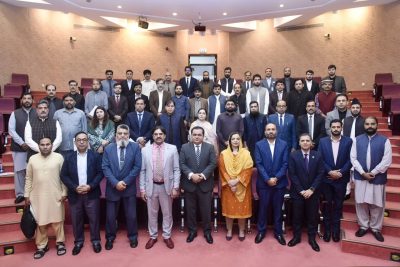
The Pakistan Institute for Parliamentary Services (PIPS) successfully organized a two-day training program titled “Understanding Parliamentary Business: Role and Functions of Council Officers” for Council Officers representing all Federal Ministries and Divisions held on October 8–9, 2025, at PIPS, Islamabad. The program was attended by 51 participants from different ministries and their allied departments. The event began with the recitation of the Holy Quran and the National Anthem, followed by a warm welcome from Mr. Asim Khan Goraya, Executive Director, PIPS. In his opening remarks, Mr. Goraya emphasized that council officers serve as a vital link between the legislature and the executive and effective coordination between ministries and Parliament is essential for a functional democracy. He encouraged participants to actively engage in the sessions to enhance their understanding of parliamentary rules, oversight tools, and their constitutional responsibilities. The inaugural session was moderated by Mrs. Samer Awais, Director General (Capacity Building & Development), PIPS, who outlined the training’s objectives and structure.
The first technical session was delivered by Mr. Sheikh Sarfaraz Ahmed, Legislative Advisor, Ministry of Railways, on “The Constitution: Understanding the Relationship between Parliament and the Federal Government.” He discussed constitutional provisions governing legislative–executive relations, separation of powers, and the legislative and non-legislative business of Parliament. Addressing participants’ queries, he elaborated on challenges faced by council officers, including time constraints in responding to parliamentary questions, and explained procedures for managing misdirected queries. Mr. Sarfaraz also discussed the process for Private Members’ Bills, Rule 31 of the Rules of Business, 1973, the President’s assent and ordinance-making powers, ministerial accountability under Article 90, and the jurisdiction of Standing Committees. Participants actively contributed with questions and comments. The second session, conducted by Mr. Muhammad Azam Sulahri, Deputy Secretary, Senate Secretariat, focused on “Responsibilities of Council Officers.” It provided practical insights into strengthening coordination between ministries and parliamentary committees. The day concluded with a session by Mr. Muhammad Anwar, Secretary (Retd.), Senate Secretariat, and former Executive Director, PIPS, on “Rules, Provisions, and Responsibilities of Council Officers in Non-Legislative Business.” He elaborated on parliamentary rules and procedures, emphasizing the preparation and handling of parliamentary questions, role of council officers in handling Parliamentary Questions, coordination with stakeholders within their Ministry and Parliamentary Secretariat, and maintenance of accuracy and timeliness in responses. His insights, drawn from years of parliamentary experience, provided valuable guidance for participants in their official roles.
The second day of the training, moderated by Mr. Muhammad Hanif Khan, Deputy Director (CB&D), PIPS, began with a warm welcome to all participants. Mr. Hanif introduced the day’s facilitator, Mr. Muhammad Mushtaq Ahmed, Advisor on Legislative Parliamentary Proceedings and Training, National Assembly of Pakistan, and shared his professional profile with the participants. Following the introduction, Mr. Mushtaq commenced his interactive and engaging session titled “Rules, Procedures and Significance of Parliamentary Oversight Tools”. The session focused on enhancing participants’ understanding of parliamentary business and the vital liaison role of Council Officers in ensuring smooth coordination between Ministries and Parliament. Through active dialogue and practical examples, Mr. Mushtaq highlighted the importance of procedural accuracy, timely communication, and adherence to parliamentary rules in strengthening institutional performance and fostering effective legislative executive relations.
The next session, conducted by Mr. Muhammad Anwar focused on “Rules, Procedures and Significance of Parliamentary Oversight Tools”. In his comprehensive presentation, he elaborated on the procedural framework governing various parliamentary instruments including, Motions, Privilege Motions, Calling Attention Notices, Adjournment Motions, Resolutions and Zero Hour interventions. Mr. Anwar underscored the pivotal role of ministry secretariats and council officers in managing parliamentary communications with precision and timeliness. He emphasized that officers must remain proactive, well-informed and fully prepared to brief their respective ministers, ensuring effective representation on the floor of the House. He further outlines the ancillary responsibilities of council officers on coordinating follow-up actions, maintaining institutional responsiveness, and upholding the standards of accountability and transparency expected in parliamentary governance.
The two-day program concluded with closing remarks by Mrs. Samer Awais, who commended the participants for their enthusiastic participation and reaffirmed PIPS’s commitment to strengthening parliamentary democracy through knowledgeable and professional capacity building. Certificates were awarded to all participants by Mrs. Samer Awais, symbolizing the successful culmination of the two-day capacity-building program and acknowledging the participant’s active engagement.